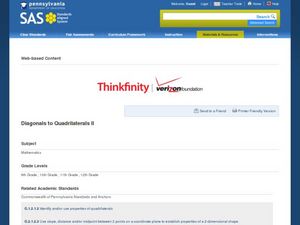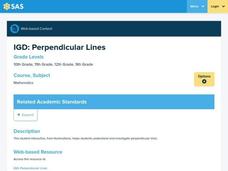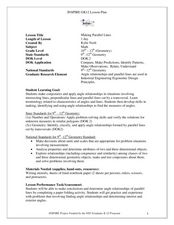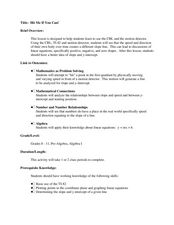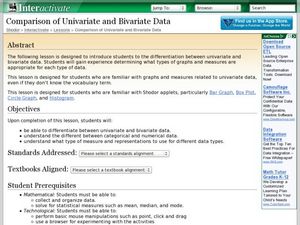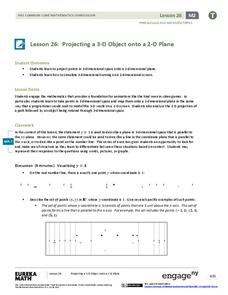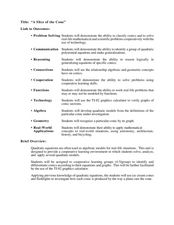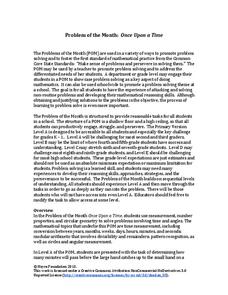Curated OER
Coordinates
Students identify and label the coordinate planes by the four different quadrants. In this geometry lesson, students plot an ordered pair correctly. They identify and differentiate between rational and irrational numbers.
Curated OER
Combination and Permutations
Students decide when to use computation and permutation to solve problems. In this algebra lesson, students apply the correct method to solve complex set of events. They differentiate between dependent and independent events.
Curated OER
Simson Line
Stuednts identify triangles for the Simson Line. In this geometry instructional activity, students solve triangular problems using the properties of triangles.They differentiate between the height, congruency and similarity.
Curated OER
Classifying Transformations
Students analyze different polygons by shapes and sides. In this geometry lesson plan, students differentiate between similar and congruent polygons. They name the different polygons based on the number of sides.
Curated OER
Diagonals to Quadrilaterals II
Learners identify the properties of different polygons. In this geometry lesson, students find the slope of a line and calculate the distance between two lines. They differentiate between similar and congruent polygons.
Curated OER
Perpendicular Lines
Students differentiate between parallel and perpendicular lines. For this geometry lesson, students identify the different angles created by perpendicular lines and parallel lines. They name the angles that are form when parallel lines...
Curated OER
Mirror Tool
Students define properties of polygons. In this geometry lesson, students differentiate between similar and congruent polygons. They identify and use the properties of solids to solve problems.
Curated OER
Making Parallel Lines
Students differentiate between parallel and perpendicular lines. In this geometry lesson, students make conjectures and apply it to solve real life situations. They collect data and make predictions based on the data.
Curated OER
Hit Me If You Can!
Students graph linear equations using slopes and intercepts. In this algebra lesson, students identify the slope as being positive,negative or undefined. They differentiate between different quadrants on a coordinate plane.
Curated OER
Similar Triangles - Applied Problems
Students differentiate between similar and congruent triangles. In this geometry instructional activity, students identify the angles of triangles using the similarity theorem. They apply concepts of triangles to the real world.
Virginia Department of Education
Scientifically Speaking
Explore the connection between operations with scientific notation and the laws of exponents. Scholars work on a set of word problems involving operations with scientific notation. Along the way, they consider how the laws of exponents...
Curated OER
Product Rule
Students define the product rule and use it to solve problems. In this calculus activity, students review rules they learned and memorize the new rules as it relates to derivatives. They solve problems through differentiation by proving...
Curated OER
Place Value Lessons
Students can learn about place value using interesting lessons, activities, and games.
EduGAINs
Data Management
Using a carousel activity, class members gain an understanding of the idea of inferences by using pictures then connecting them to mathematics. Groups discuss their individual problems prior to sharing them with the entire class. The...
Curated OER
Pythagoras' Theorem
Learners are introduced to the Pythagoras' Theorem and its history, proofs and practice in application. Students find perimeters, areas and volume of everyday objects. Learners state and explain the theory.
Curated OER
Comparison of Univariate and Bivariate Data
Learners explore the concept of univariate and bivariate data. In this univaritate and bivariate data activity, pupils discuss the differences between univariate and bivariate data. They work sample problems where they must construct box...
EngageNY
Projecting a 3-D Object onto a 2-D Plane
Teach how graphic designers can use mathematics to represent three-dimensional movement on a two-dimensional television surface. Pupils use matrices, vectors, and transformations to model rotational movement. Their exploration involves...
EngageNY
Comparing Linear and Exponential Models Again
Making connections between a function, table, graph, and context is an essential skill in mathematics. Focused on comparing linear and exponential relationships in all these aspects, this resource equips pupils to recognize and interpret...
Curated OER
"A Slice of the Cone"
Here is a set of lessons that explore conics in a number of different ways. Starting with modeling how a conic is produced by the way a plane cuts the cone, to solving complex word problems, algebra learners progress through a series of...
National Security Agency
Multiple Representations of Limits
After an introductory activity to demonstrate the theory of a limit, additional activities approach a limit from graphical, numerical, and algebraic methods. The activity looks at the multiple ways of understanding and evaluating a limit.
Noyce Foundation
Once Upon a Time
Examine the relationship between time and geometry. A series of five lessons provides a grade-appropriate problem from elementary through high school. Each problem asks learners to compare the movement of the hands on a clock to an angle...
Noyce Foundation
Surrounded and Covered
What effect does changing the perimeter have on the area of a figure? The five problems in the resource explore this question at various grade levels. Elementary problems focus on the perimeter of rectangles and irregular figures with...
Noyce Foundation
Perfect Pair
What makes number pairs perfect? The resource provides five problems regarding perfect pairs of numbers, the definition of which changes in complexity with each task. Solutions require pupils to apply number sense and operations, as well...
Noyce Foundation
Cubism
If cubism were a religion, would you follow it? Lower-level tasks focus primarily on counting the number cubes in a structure and relating the number to surface area. As learners progress to higher-level tasks, isometric drawings and...






